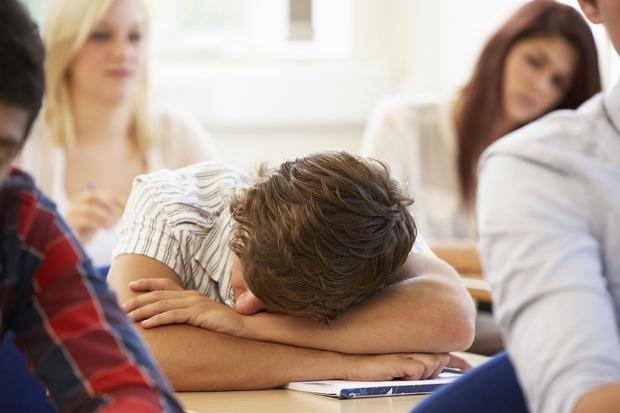Teen Sleep Deprivation Hinders Academic Progress
We have all experienced the feeling of exhaustion, a desire to close our eyes and fall into a deep, peaceful slumber. Sometimes we might feel this way in the middle of class, at work, or even throughout our entire daily lives. Teenagers are the most susceptible to this feeling. They might lay their heads down in class, they might fall asleep listening to a lecture, or they might have pounding headaches that will simply not go away. The only question is: why?
To begin, everyone has a circadian rhythm that works as an internal biological clock. The internal clock influences body temperature, sleep cycles, appetite, and hormonal changes. Puberty changes a teen’s internal clock, telling the teen to fall asleep later and wake up later. This change is due to the fact that the brain hormone melatonin is produced later at night for teens than it is for adults and younger kids. This is what makes it more challenging for teens to fall asleep before 11 p.m.
The National Sleep Foundation states that “teens need about 8 to 10 hours of sleep each night in order to function best.” Most teens do not get this much sleep. One study discovered that only 15 percent of teens reported sleeping 8 ½ hours on school nights. How are teens supposed to get eight or more hours of sleep, when their bodies are programmed to fall asleep after 11 p.m. and they have to be at school at 7:30 a.m.?
Sleep is food for the brain and provides us with the energy we need to function throughout the day. With adequate sleep, we can execute life’s daily tasks with no problem. Studies show that people tend to perform better on mental tasks (such as tests) when they are well rested. Sleep helps us maintain alertness. Teens, in particular, need their sleep so they can balance their daily activities of sports, jobs, classes, and homework. When they don’t get enough sleep, they do not perform these tasks at their highest potential.
William Dement, MD, Ph.D., founder of the Stanton Sleep Disorders Clinic, the first of its kind agrees. He explains, “High school is the real danger spot in terms of sleep deprivation. Nobody performs at the level they could perform.” This includes on the roadways, on the sports field, and in terms of physical and emotional health. Teens should be exercising their superior best in school, but yet most of them do not. Not only is this because some students are lazy or lackadaisical in school, but surprisingly enough, because they are not getting the sleep their bodies’ desire.
Why are students not attaining their recommended hours of sleep? When a teenager is biologically programmed to fall asleep at 11 p.m., he or she should typically not wake up until approximately 8 a.m., giving that person roughly nine hours of sleep. That is technically impossible when most middle and high schools start at 8:00 or 8:30. Unfortunately, Olympic Heights starts even earlier, at 7:30.
Students are gaining, at the most, seven to 7 ½ hours of sleep a night (if they are lucky) when their bodies need eight or more. Although that does not sound like such a significant difference, it truly is. Sleep deprivation can have a negative effect on mood, the ability to think and concentrate, to react, to regulate emotions, and to learn and get along with adults. It can make one feel miserable, perform poorly, eat too much or too little, make one prone to acne and other skin conditions, and can lead to an increase in the use of caffeine, alcohol, and drugs. Additionally, it is also a component of many mood disorders, such as anxiety, depression, and bipolar disorder. When these ingredients are amalgamated with a teen’s natural impulsive behavior, a potentially dangerous situation is created.
The combination of these factors can lead numerous teenagers to substance use, risky behavior, and even suicide. Rebecca Bernert, Ph.D., who directs the Suicide Prevention Research Lab at Stanford University, says sleep may affect the way in which teens process emotions. Bernett’s work with civilians and military veterans indicates that lack of sleep can make people more receptive to negative emotional information, which they might shrug off if they were fully rested.
Sleep is the buffer that helps prevent someone from thinking toward dire solutions, such as suicide. Research indicates that sleep-deprived teens are way more likely to use stimulants like caffeine and nicotine to get through the day, but also to deal with sleep-related moods by self-medicating with alcohol. They are also more likely to participate in unprotected sex and reckless driving than teens that get more than seven hours of sleep a night because they lack impulse control and suffer from impaired judgment that leads to bad decision making.
The National Sleep Foundation reports that “drowsiness and falling asleep at the wheel cause more than 100,000 car crashes every year. When you do not get enough sleep, you are more likely to have an accident, injury, and/or illness.” Although teens do both, sleep-deprived driving is actually like the equivalent of driving drunk.
Studies have shown a link to later start times and positive health. A University of Minnesota study demonstrates the impact of pushing back school start times. The Minneapolis School District changed the starting times of two high schools from 7:15 a.m. to 8:40 a.m. and asked UMN researchers to look at the impact of the change. The results revealed that students reported feeling less depressed and more empowered to succeed. Then they changed the start school times for all their schools and found similarly positive results. Attendance rates rose, students reported getting an hour’s more sleep each school night – a total of 5 more hours a week – countering skeptics who argued that students would respond to the later school times by going to bed later. This was a landmark experiment that forever changed the issue of school start times. Today, many more schools have implemented later start times. But much more still needs to be done to address this problem.
The Huffington Post’s Carolyn Gregoire notes, “Over 90 percent of American high school students are chronically sleep-deprived. 20 percent are getting less than five hours per night.” What other factors, besides biological, contribute to this? Many students are overwhelmed by a gargantuan amount of work that includes homework, stressful assignments, tests, essays, and projects in class. Sometimes, it is just so much that students stay up to midnight or later working on these assignments.
Students also participate in outside activities, such as sports, clubs, social service projects, and even part-time jobs. They are pressured by their parents, peers, and community to exceed and they try to live up to these expectations, but by doing so, they are not performing at their fullest because they are not getting the sleep they need.
Electronic media does not aid the situation, either. Smartphones, iPods, computers, and televisions are often used and keep teens awake long into the night. Just the light from a screen can prevent the brain hormone melatonin from signaling sleep to the brain. In a teen’s mind it is not nighttime yet, so it’s not time to go to bed. So, next time think twice before you use your phone right before you go to sleep. You are actually waking up your brain, rather than putting it on snooze mode.
What can be done by teens to address this situation? There are several suggestions that the National Sleep Foundation recommends teens take to help them gain more sleep. They suggest that teens take carefully planned naps that are short and not close to bedtime and that they keep their room cool, dark, and quiet. Teens should also avoid caffeine, nicotine, and alcohol. They need to stop consuming coffee, tea, soda, and chocolate late in the day so that they can get additional sleep at night.
The foundation also recommends that teens establish a bed and wake up time that is consistent and scheduled. They should not exercise within hours of their bedtime and they should not leave their homework for the last minute. Teens should also avoid electronic devices in the hour before bed; instead they should participate in calm activities such as taking a bath/shower or reading a book. Although many teens are faced with the challenges of getting quality sleep, there are solutions that can be enacted that can help them gain their vital hours.
To conclude, sleep is a necessary component of life. Teens require their sleep and by following these recommendations, they might have a better chance of defeating the ubiquitous epidemic known as sleep deprivation.












Carole Parker • Oct 29, 2016 at 9:45 pm
This article was extremely informative and well written! More school administrators who decide school starting times should read it.